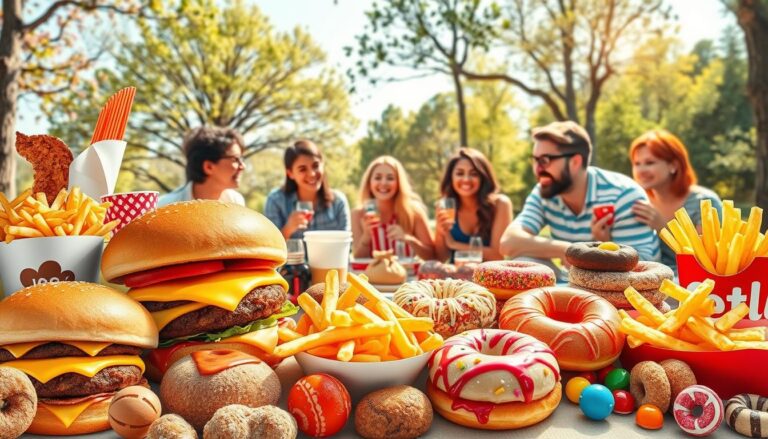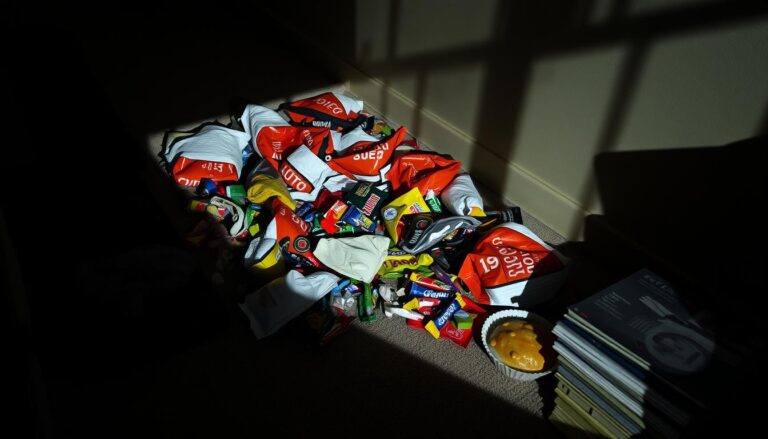Is “Food Coma” A Real Thing?
“Food coma” is a real feeling of tiredness after eating a big meal. And YES it is a real thing!
The super technical name for it is “postprandial somnolence.” This feeling is common, especially during holidays like Thanksgiving and Christmas.
On these days, we often eat a lot of rich food. This can make us feel very sleepy. Even though there’s not much research on it, many people know what it’s like to feel tired after eating.
The eyes begin to droop, your head nods, and you can’t imagine not hitting the couch for a nap if a jolt of coffee isn’t within reach.
Understanding the Concept of Food Coma
A food coma is when you feel very sleepy after eating a lot. It often happens after big meals, like on Thanksgiving. It’s not the same as a medical coma. It’s how your body reacts to digesting food.
The amount and type of food eaten play big roles in food coma. This concept started in the 1980s and became well-known by 2020. When you eat a big meal, your body uses energy to digest it, making you feel sleepy.
Turkey is often blamed for food coma because of its tryptophan. But, actually turkey has the same amount of tryptophan as chicken, beef, or eggs. The body’s relaxation system is also active after eating, making you feel tired.
Big meals, especially those with a lot of protein, can make you feel more tired. This is because your body takes longer to digest them. Your body’s natural sleepiness in the afternoon also plays a part.
High sugar foods, like bread and pasta, can make your blood sugar go up. This makes your pancreas work harder, which can make you feel tired.

How you react to food coma can vary. Things like what you eat, how much, and when can affect it. Light exercise after eating might help keep your blood sugar stable and prevent food coma.
What Causes a Food Coma?
Understanding what triggers a food coma can help us know why we feel tired after eating. Many things can cause this feeling, like changes in blood flow and the size of our meals. Also, the types of food we eat play a big role.
Changes in Blood Circulation
Some thought that big meals made our brain get less blood. But new studies say this isn’t true. They found that our brain still gets enough blood, even when we’re digesting food.
There might be a tiny drop in blood flow after eating. But it’s not clear if this is why we feel so sleepy. So, blood flow changes might not be the main cause of feeling tired after eating.
Impact of Eating Large Meals
How big our meals are can really affect how tired we feel. Big meals, especially those with lots of protein and fats, can make us feel really sluggish. People who eat big meals often feel much more tired than those who eat smaller ones.
It’s important to watch how much we eat. Eating too much can make us feel really tired.
Speaking of, if you want some rich and delicious comfort food pretty much guaranteed to cause Food Coma, then check out these decadent side dish recipes. You know… for research purposes.
Role of Macronutrients in Food Coma
The kinds of nutrients in our food, like carbs, proteins, and fats, affect how we feel after eating. Foods high in carbs can make our blood sugar go up and then crash, making us tired. Foods with lots of protein can make us feel sleepy because they help make serotonin.
Big meals with lots of fat can also make us feel tired. This is because our body takes longer to digest them, which can make us feel really sleepy. Knowing how these nutrients work can help us plan our meals better and stay more alert.

Symptoms of Food Coma
Knowing the signs of food coma can help you spot it. It’s not just feeling sleepy after eating. It includes many physical and mental signs. By knowing these symptoms, you can take steps to lessen their impact.
Common Signs to Identify
Feeling very tired and drowsy are common signs of food coma. You might also feel low energy, have trouble focusing, and feel bloated or gassy. This feeling of being very full often happens after eating a big, rich meal.
This can make you feel really tired. Knowing these signs helps you understand how your body reacts to big meals. It can also be affected by eating more protein or fat.
Variability in Experience
It’s important to remember that food coma can affect people differently. A study with Brazilian truck drivers showed that balanced meals made them less sleepy. This shows how what you eat can change how you feel after eating.
Things like your metabolism, health, and eating habits also play a big role. This means that how much you feel the effects of food coma can vary a lot.
Some people might feel very tired after eating, while others might just feel full. Knowing this can help you make choices that might prevent or lessen food coma symptoms. This can improve your overall health and well-being.
| Food Type | Effect on Sleepiness |
|---|---|
| High-Protein Meals | Increased sleepiness |
| High-Fat Meals | Increased digestive energy required |
| Balanced Meals | Less likely to cause sleepiness |
| Alcohol | Contributes to drowsiness |

How Long Does a Food Coma Last?
The time a food coma lasts can vary a lot. People often feel very tired for several hours after eating. This tiredness usually peaks in one to two hours. Things like how fast you digest food, what you eat, and how much you eat can affect this.
Big meals, especially those with lots of carbs, sugars, and fats, can make you feel drowsier for longer. A study found that truck drivers eating a “prudent” diet felt less tired. This shows that what you eat can affect how alert you are.
Several factors can affect how long a food coma lasts:
- Meal size: Bigger meals make you sleepier for longer.
- Nutritional content: Foods high in fat can make you feel more tired.
- Individual metabolism: Everyone’s body is different in how it handles food.
- Hydration levels: Not drinking enough water can make you feel more tired.
The foods you eat matter a lot. Foods high in protein, like turkey, can make you feel sleepier. Carbs help your body use tryptophan, which also makes you feel tired after eating.
To summarize, here are the main things that affect how long a food coma lasts:
| Factor | Impact on Duration |
|---|---|
| Meal Size | Longer duration of sleepiness with larger meals |
| Nutritional Content | High-fat or high-sugar meals typically lead to prolonged effects |
| Individual Metabolism | Varies; some may experience quicker recovery |
| Hydration Levels | Dehydration can enhance fatigue symptoms |
Is Food Coma Dangerous?
Feeling sleepy after eating is common and usually safe. It’s called food coma and can make you feel a bit drowsy. But, there are times when it could be dangerous.
For example, if you need to stay alert, like driving, feeling too tired is risky. People with diabetes should watch their energy levels after meals. A big drop in energy could mean blood sugar problems.
Studies show that food coma can affect how well you think. A big study in India found that students scored 5% to 9% lower on tests after eating. Kids taking exams after meals did especially poorly, showing how food coma can hurt focus and performance.
It seems that those with less money are more affected by food coma. Richer families might know more about it and avoid it better by choosing what they eat.
To avoid food coma risks, eating in moderation and choosing balanced meals is key. It’s not just what you eat, but how much that matters to stay safe.
| Factor | Impact |
|---|---|
| Cognitive Performance | Decreased by 5% to 9% after eating |
| Economic Status | Lower resources correlate with greater cognitive impairment |
| Meal Size | Larger portions more likely to induce post-meal fatigue |
| Knowledge of Food Coma | Higher awareness in affluent households mitigates risks |
| Presence of Health Conditions | Increased monitoring necessary for conditions like diabetes |
How to Recover from Food Coma…
Sometimes you just can’t help but indulge. The food is too delicious, or Grandma will be disappointed if you don’t get seconds (or thirds), and during the holidays, there are pretty much sweets everywhere you go.
So when Food Coma can’t be helped, then the best way to counteract the sleepiness is with a dose of caffeine. A cup of coffee, or a cappuccino, or a cold brew is a great way to jumpstart your energy and get you back on track.
For some amazing deals on Coffee Related products, check out some of our favorite items and products that could be a real life saver when your eyelids begin to droop. It’s just what the doctor ordered!
FAQ
What is a food coma?
A food coma, or postprandial somnolence, is when you feel very tired after eating a big meal. It happens more during holidays. It’s not a sickness, but a natural body reaction to digesting food.
What causes a food coma?
The main reason for a food coma is how your body digests food. Hormonal changes and the type of food you eat play a big role. Big meals with lots of protein and fat make you feel sleepier.
How long does a food coma last?
How long a food coma lasts can vary. But, most people feel the worst tiredness one to two hours after eating. Then, they start to feel better.
Are there dangers associated with food coma?
Food coma is usually not dangerous. But, it can make you less alert. This is bad if you have to drive or work with machines. People with diabetes should watch how tired they get after eating.
How can I prevent a food coma?
To avoid a food coma, eat smaller meals and keep your diet balanced. Drink plenty of water and eat mindfully. This helps your body digest food better and feel full longer.
What are the common symptoms of a food coma?
Signs of a food coma include feeling very sleepy, tired, and having low energy. You might also have trouble focusing and feel bloated. These symptoms happen after eating a big, rich meal.
Is a food coma a sign of overeating?
Yes, feeling a food coma can mean you ate too much. This is especially true for big meals with lots of carbs, proteins, and fats. These can make you very tired after eating.
Why do I feel sleepy after lunch?
Feeling sleepy after lunch is natural. It’s because of your body’s natural sleep cycle and the energy it uses to digest food. Blood sugar levels also play a role.







